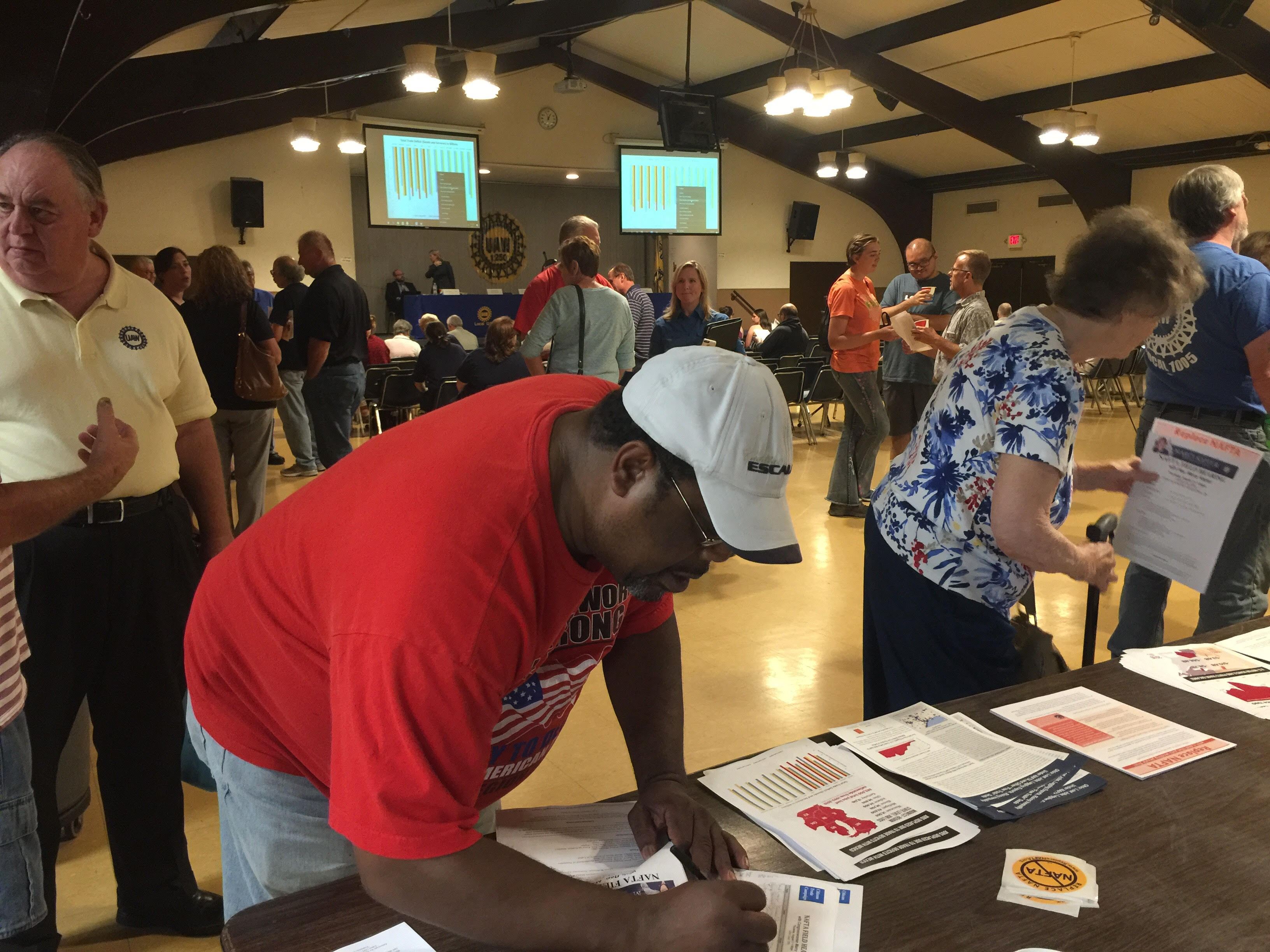by STAN SORSCHER
(May 28, 2018) — In 2016, President Trump prevailed over 17 establishment opponents. He is a disrupter. In particular, he disrupted establishment trade policies that have failed millions of Americans.
 Too many workers and communities have been left behind. Too much mistrust has grown regarding the way we’ve managed globalization. Wages have fallen far behind the growth trends of previous generations.
Too many workers and communities have been left behind. Too much mistrust has grown regarding the way we’ve managed globalization. Wages have fallen far behind the growth trends of previous generations.
The neoliberal free-market free-trade trickle-down orthodoxy, which we have followed for decades, is exhausted — socially, politically, and economically.
We don’t really understand Trump’s tariffs, or bluster, or impulsive negotiating tactics, but we do understand that we need a change in direction.
We need new, effective public policies to deal with real problems that affect most people in America — inequality, climate change, health care, opioid addiction, student debt, and decaying infrastructure. We desperately need a manufacturing strategy that creates good new jobs, and stronger employment relationships that would raise family income.
To paraphrase Ronald Reagan, “Unregulated free market orthodoxy cannot solve these problems — free market orthodoxy IS the problem.” Our big policy challenges are all market failures.
David Brooks told us that Donald Trump is the wrong answer to the right questions. Trump’s disruption gives us the opportunity, right now, to find better answers the right questions. We should start by rehabilitating the role of public policy, restoring trust in public institutions and re-legitimizing the role of government in solving our problems.
China understands this. So do Japan, South Korea, Germany, and the Nordic countries. Also, they all recognize their legitimate national interests. They have various forms of mixed economies, including well-designed industrial policies to improve their living standards. We understood this when we industrialized our economy, and we understood it again in the decades after World War II.
China has a national strategy to become the leader in 10 industries of the future. South Korea built a formidable manufacturing economy and raised living standards dramatically. China, Japan, and Europe have modern high-speed rail. China is investing in billions for infrastructure to move goods to their key markets around the world. China targeted solar energy as a key industry of the future, and invested $126 billion there last year.
 On the other hand, our economic and trade policies steadily moved our industrial base offshore and we tell ourselves “these jobs won’t come back.” We accept “D+” ratings on our neglected infrastructure, and can’t pass an infrastructure bill. Our approach is ill-suited to the 21st century global economy.
On the other hand, our economic and trade policies steadily moved our industrial base offshore and we tell ourselves “these jobs won’t come back.” We accept “D+” ratings on our neglected infrastructure, and can’t pass an infrastructure bill. Our approach is ill-suited to the 21st century global economy.
China invests billions in R&D, knowing their investment will be commercialized in their domestic economy. Our billions in publicly funded R&D will be commercialized offshore, producing good jobs in Malaysia, Vietnam, India, China, Mexico, and Ireland.
Foreign students are subsidized to study at U.S. universities. Our own students pay prohibitive tuition costs, taking on debt and risk. Many graduates don’t find a job in their field of study.
We have done better on each of these measures in the past.
Inequality and climate change — the defining problems of our time — are the biggest market failures in human history. Solutions will require new public policies. NAFTA and subsequent trade policies take exactly the wrong approach. They are designed to merge our economy into the global economy, blur national borders, and push aside public interests.
Economic and trade policies should balance investor interests with public interests. That’s what we expect any political system to do. That will be necessary, important, and fundamentally different from the trickle-down economic policies and free-trade NAFTA approach.
President Trump fumbles with this realization. He recognizes the urgency of “doing something.” His tariffs are certainly something, but Trump’s instinct is to tear down social cohesion, hit back at his rivals, fan conflict, and diminish our leadership in the world.
 Our first conversation should be about restoring social cohesion, and recognizing that we all do better when we all do better. Our purpose is to raise living standards and improve well-being in our communities. In a mixed economy approach, we would create policy-driven strategies to address inequality, climate change, health care, education, investment in infrastructure, restoring our industrial base, and making key social investments we have let wither for 30 years.
Our first conversation should be about restoring social cohesion, and recognizing that we all do better when we all do better. Our purpose is to raise living standards and improve well-being in our communities. In a mixed economy approach, we would create policy-driven strategies to address inequality, climate change, health care, education, investment in infrastructure, restoring our industrial base, and making key social investments we have let wither for 30 years.
When President Trump says it, it sounds ominous, but every country does expect public policies to express their legitimate national interests. What we don’t hear from President Trump is that the purpose of an economy is to raise living standards. That is true of our domestic economy, and equally important for the global economy. We can recognize legitimate national interests, raising living standards everywhere, without being nationalists or xenophobic.
President Trump has disrupted economic orthodoxy. We no longer expect the invisible hand of free markets to solve serious social, environmental, and economic problems. But, Donald Trump is transactional; he lacks a coherent vision. His answers look suspiciously beneficial for global corporations, the financial industry, and very wealthy donors.
We have campaign seasons in 2018 and 2020 to consider different answers to Trump’s questions. Where should we be investing in people, infrastructure, innovation, industries, communities, and clean energy? In each case, we should ask, “Who gets the gains from productivity, innovation, investments, and globalization?”
President Trump has put those questions into play. We haven’t had this good an opportunity for years.
 Stan Sorscher is a labor representative for the Society of Professional Engineering Employees in Aerospace (SPEEA), IFPTE 2001.
Stan Sorscher is a labor representative for the Society of Professional Engineering Employees in Aerospace (SPEEA), IFPTE 2001.
 Trade officials are racing to complete their renegotiation of the North American Free Trade Agreement (NAFTA) within the coming weeks — and, not suprisingly, corporate lobby groups are pushing hard to ensure that NAFTA provisions that make it easier to outsource jobs, drive down wages and pollute the environment are maintained.
Trade officials are racing to complete their renegotiation of the North American Free Trade Agreement (NAFTA) within the coming weeks — and, not suprisingly, corporate lobby groups are pushing hard to ensure that NAFTA provisions that make it easier to outsource jobs, drive down wages and pollute the environment are maintained.


 Too many workers and communities have been left behind. Too much mistrust has grown regarding the way we’ve managed globalization. Wages have fallen far behind the growth trends of previous generations.
Too many workers and communities have been left behind. Too much mistrust has grown regarding the way we’ve managed globalization. Wages have fallen far behind the growth trends of previous generations.

 Our first conversation should be about restoring social cohesion, and recognizing that we all do better when we all do better. Our purpose is to raise living standards and improve well-being in our communities. In a mixed economy approach, we would create policy-driven strategies to address inequality, climate change, health care, education, investment in infrastructure, restoring our industrial base, and making key social investments we have let wither for 30 years.
Our first conversation should be about restoring social cohesion, and recognizing that we all do better when we all do better. Our purpose is to raise living standards and improve well-being in our communities. In a mixed economy approach, we would create policy-driven strategies to address inequality, climate change, health care, education, investment in infrastructure, restoring our industrial base, and making key social investments we have let wither for 30 years. Stan Sorscher is a labor representative for the Society of Professional Engineering Employees in Aerospace (SPEEA), IFPTE 2001.
Stan Sorscher is a labor representative for the Society of Professional Engineering Employees in Aerospace (SPEEA), IFPTE 2001. 









